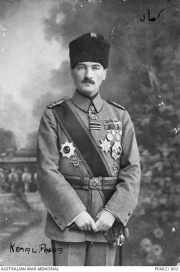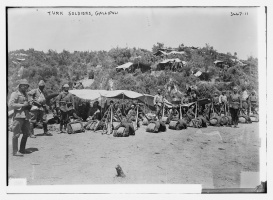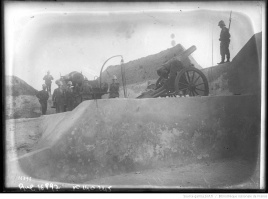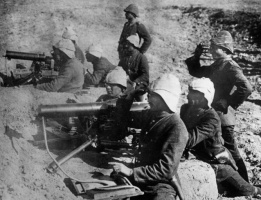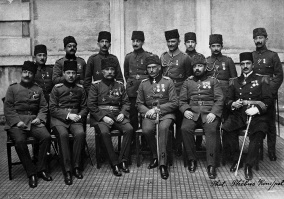Introduction↑
Mustafa Kemal Pasha (1881-1938) was an Ottoman military officer who fought on three different fronts in World War I. After the war he emerged as the leader of the resistance against the dismemberment of the Ottoman Empire in Anatolia, the “Defence of National Rights” movement. After the victory of this resistance movement in 1922 he went on to proclaim the Republic of Turkey on 29 October 1923 and became its first president. Upon the introduction of family names in Turkey in 1934, the national assembly awarded him the surname Atatürk (Father Turk).
Early Career↑
Mustafa Kemal was a member of the Young Turk Committee of Union and Progress (CUP), which he joined in February 1908. After the successful Young Turk revolution of July 1908, Mustafa Kemal was sent by the committee to Tripolitania to explain the revolution and gain the support of the local Arab elite in this North African province. In April 1909, while he was chief of staff of the Thessaloniki reserve division, he played a significant role in the formation of the “action army” that marched on Istanbul and suppressed the anti-constitutionalist counterrevolution on behalf of the CUP.
When the Italians invaded Tripolitania and Cyrenaica in 1911, Mustafa Kemal was one of the few dozen Young Turk officers who went there as volunteers to organize the resistance of the Arab tribes against the invaders. He served there under the command of his colleague Enver Pasha (1881-1922) and the two seem to have fallen out there, but the precise cause is unknown. When the Balkan War broke out in October 1912 most Turkish officers, including Mustafa Kemal and Enver, returned to the capital.
The position of Mustafa Kemal as a promising young officer with political connections changed fundamentally in January-February 1913. In January the CUP carried out a coup d’état, which brought Enver to the fore as the principal military leader. Enver would then become both war minister and vice-commander in chief (under the sultan) a year later. Shortly after the coup, Mustafa Kemal’s relations with Enver, already bad since 1911, became worse when the amphibious operation against the Bulgarians at Şarköy failed as a result of the lack of coordination between the X Corps, under Enver, and the Bolayır Corps, where Mustafa Kemal served as chief of operations under his old friend Ali Fethi (1880-1943). This led to fierce recriminations, with Fethi and Mustafa Kemal on one side and Enver on the other, in which the high command had to intervene.
World War I Years – Beyond the Gallipoli Narrative↑
As a result, Fethi left the army and was appointed ambassador in Sofia in October 1913. Mustafa Kemal did not leave the army, but shortly after joined him as military attaché in Sofia. Hence, the outbreak of war on 10 November 1914 found Mustafa Kemal in a diplomatic posting rather than on active military service. Nevertheless, he requested that he be given a field command in Sofia and was consequently given command of the 19th Reserve Division – then a skeleton division being built up with newly mobilised conscripts in Rodosto (Tekirdağ). On completion, this division moved to the Dardanelles, where it was held as a reserve force of the III Corps under Esat Pasha (1862-1952). When the Allies landed on 25 April, Mustafa Kemal countered them on his own initiative and managed to occupy the Arıburnu ridge, thus preventing an Allied breakthrough. When the British tried to break the deadlock at the Dardanelles though landings at Suvla Bay in August 1915, Mustafa Kemal again played an important role. He was given the command of the troops defending the ridges above the bay and managed to halt the British advance from the landing beaches to the heights of Anafartalar, ordering fierce counterattacks. This allowed the overall commander of the front, German General (and Ottoman Field Marshal) Otto Liman von Sanders (1855-1929), to reinforce the defense of the area. By mid-August the British attack had been contained.
After Mustafa Kemal became president of the Turkish Republic in 1923 and a personality cult developed around him, he was portrayed in Turkish historiography as the single-handed victor of the Gallipoli Campaign, erasing the role of the German commanders. This historiographical tradition was reinforced after the military coup of September 1980, when the junta sought to reinforce the personality cult of Atatürk in order to counter ideological challenges from the right and the left. Yet the reality was different: Mustafa Kemal twice played a crucial role in containing the British and ANZAC advances, but in fact he served as a divisional commander with the rank of colonel under both General Esat Pasha, commander of the III Corps, and Liman von Sanders, overall commander of the Fifth Army that defended the Dardanelles.
Mustafa Kemal left the Dardanelles on sick leave in November 1915 and, after the British withdrawal from the Dardanelles at the end of 1915, he was given command of the 16th Army Corps on the Eastern Front. This newly formed force, which consisted of divisions transferred from Thrace, took part in the offensive of the Second Army in August and September 1916, managing to take Bitlis and Muş (areas which had been the scene of devastating deportation and killing of Ottoman Armenians the year before), but most of the conquests had to be abandoned within weeks due to the Russian counterattacks. After the failed offensives of the Third and Second Armies, the Eastern Front was finally put under the unified command of Ahmed İzzet Pasha (1864-1937), and Mustafa Kemal was promoted to deputy commander of the whole Second Army in March 1917. Although the Ottoman offensive was on the whole a costly failure, Mustafa Kemal himself performed well: consequently, he was promoted to brigadier general (bringing him the title of “Pasha”) and decorated.
Conflict and Critique↑
While gaining a reputation as a very able field commander, Mustafa Kemal also became known as a critic of the overall war policy and particularly of Enver’s close cooperation with the Germans. As a proud Turkish nationalist, he had already fallen out with German colleagues on the Gallipoli Front. While in Istanbul on sick leave in November 1915, he complained about the German influence on the army to members of the cabinet. Furthermore, he disregarded the chain of command and army discipline while serving in the east, sending out a circular with complaints to his fellow commanders. The issue came to a head in July 1917 when Mustafa Kemal was appointed commander of the Seventh Army, which was being assembled in Aleppo with divisions transferred from the European fronts. The Seventh Army was a component of the “Lightning Army Group” (Yıldırım Ordular Grubu, or Heeresgruppe F in German), under the command of the former German Chief of Staff Erich von Falkenhayn (1861-1922) and was intended for launching a counteroffensive across the desert against the British Expeditionary Force that was pushing north in Mesopotamia.
From the start, Mustafa Kemal’s relations with von Falkenhayn were strained and irritation grew when the Lightning Army Group was redirected to the Sinai Front. Mustafa Kemal wrote a long and detailed memorandum to War Minister Enver Pasha, copying in Grand Vizier Talat Pasha (1874-1921), in which he attacked the Germans who in his eyes lacked knowledge of circumstances in the Middle East and were sacrificing the Ottoman Empire for their own interests, encouraging irresponsible offensive actions in locations where every soldier was needed for defense. He demanded overall command of the Sinai Front. When he received only a formal reply, he resigned his command, refused a meeting with Falkenhayn, and returned to Istanbul in October 1917.
In spite of all this insubordination, he was not discharged. Instead Enver Pasha asked Mustafa Kemal to accompany the heir apparent, Prince Mehmed Vahidettin (1861-1926), on a visit to the German headquarters in Bad Kreuznach in December. During the trip Mustafa Kemal attempted in vain to persuade Vahidettin to take over command of the Fifth Army at the Dardanelles and appoint himself as chief of staff. After their return to the capital in early January, Mustafa Kemal was taken ill with kidney inflammation. In May he received permission and money to seek treatment in Austria, first in Vienna and then in the spa of Karlsbad in Bohemia. There he remained until ordered back in August to be reappointed as commander of the Seventh Army on the Palestine Front, where Liman von Sanders had since replaced von Falkenhayn as overall commander. Mustafa Kemal arrived at the front (which after the British offensive of December 1917 had been reestablished to the north of Jerusalem) on 17 August 1918, two months before the Battle of Megiddo in which the British routed the Ottoman armies in Palestine.
The Seventh Army held the left (or eastern) part of the Ottoman defensive line but following the quick progression of Edmund Allenby’s (1861-1937) cavalry north into Galilee, after the fall of the Eighth Army on the coastal plain to the right on 19 September, Mustafa Kemal had to retreat north as fast as possible to escape envelopment. Under continuous pressure from the British forces, he managed to keep the Seventh Army largely intact and conducted a fighting retreat to a line north and west of Aleppo. Upon the conclusion of the Armistice of Mudros (30 October 1918), Liman von Sanders and all other German officers were recalled and Mustafa Kemal succeeded him as commander of the Lightning Army Group. By then this “army group”, headquartered in Adana, numbered fewer than 15,000 men. A week later, the Lightning Army Group was dissolved by the government in Istanbul and Mustafa Kemal was recalled. He arrived back in the capital on 13 November 1918.
Transition from Military to Political Realm – Leader of the National Resistance Movement↑
In the first few months after his return, Mustafa Kemal tried to build a position in domestic politics. He did this partly through the Ottoman Liberal People’s Party (Osmanlı Hürriyetperver Avam Fırkası), a new party founded by his friend Ali Fethi and whose newspaper Minber (The Pulpit) he helped to finance. This party gained the support of some thirty dissident members of the CUP in parliament but it was dissolved in December. Another avenue was through his personal connection with the monarch, Sultan Vahidettin, who had ascended the throne in July 1918 and with whom he had previously travelled to Germany. He was received in audience four times but failed in his ambition to be appointed to high office. In a third attempt to establish himself in politics, he approached the Italian and British military authorities through intermediaries. When none of these attempts yielded any results, in the spring of 1919 Mustafa Kemal decided to join the Unionist underground, which had been preparing a resistance movement in Anatolia since late 1918.
The remnants of the network of the CUP, together with some Unionist army officers, started preparing resistance against a post-war peace agreement that could lead to the handover of large parts of Anatolia and Thrace to the Greeks and Armenians. These preparations were both political, through the creation of regional congresses that claimed to express the “national will” and were based on Woodrow Wilson’s (1856-1924) concept of self-determination, as well as military: militias were armed and the demobilization and disarmament that were conditions of the Mudros armistice were sabotaged. The Unionist underground in the capital was looking for someone who could lead the embryonic “national rights” movement and they approached Mustafa Kemal who, with his strong reputation among fellow army officers (including Kazım Karabekir (1882-1948) and Ali Fuat (1882-1968) who were already resisting disarmament in Anatolia) and his known opposition to the now discredited wartime regime of Enver and Talat, was well positioned for this role.
After he accepted, an appointment to the post of inspector-general of the Ninth Army (comprising the XV and III Army Corps in Central and Eastern Anatolia) was arranged through friendly contacts in the Ministry of Interior and the War Ministry. On 16 May 1919 Mustafa Kemal left for Anatolia, landing at Samsun three days later. His official remit was to oversee the disarmament and preserve public order but, upon arrival, he immediately started to contact military and civilian authorities with a view to organising the resistance. Consequently, he was recalled by the War Ministry, however, when he did not comply and instead continued to encourage and organise the resistance in Anatolia, the government decided to cashier him. But just before they did, on 9 July 1919, Mustafa Kemal Pasha resigned his commission, thus ending his fifteen-year career as an officer in the Ottoman army. In the years that followed, he would emerge as the unquestioned leader of the national resistance movement and the Turkish War of Independence.
Erik-Jan Zürcher, Universiteit Leiden
Managing Editor: Nazan Maksudyan
Section Editor: Erol Ülker
Selected Bibliography
- Andrew, Mango: Atatürk, London 1999: John Murray.
- Beşikçi, Mehmet: The Ottoman mobilization of manpower in the First World War. Between voluntarism and resistance, Leiden 2012: Brill.
- Erickson, Edward J.: Ordered to die. A history of the Ottoman army in the First World War, Westport; London 2001: Greenwood Press.
- Zürcher, Erik-Jan: Atatürk as a Young Turk, in: New Perspectives on Turkey 41, 2009, pp. 211-262.




